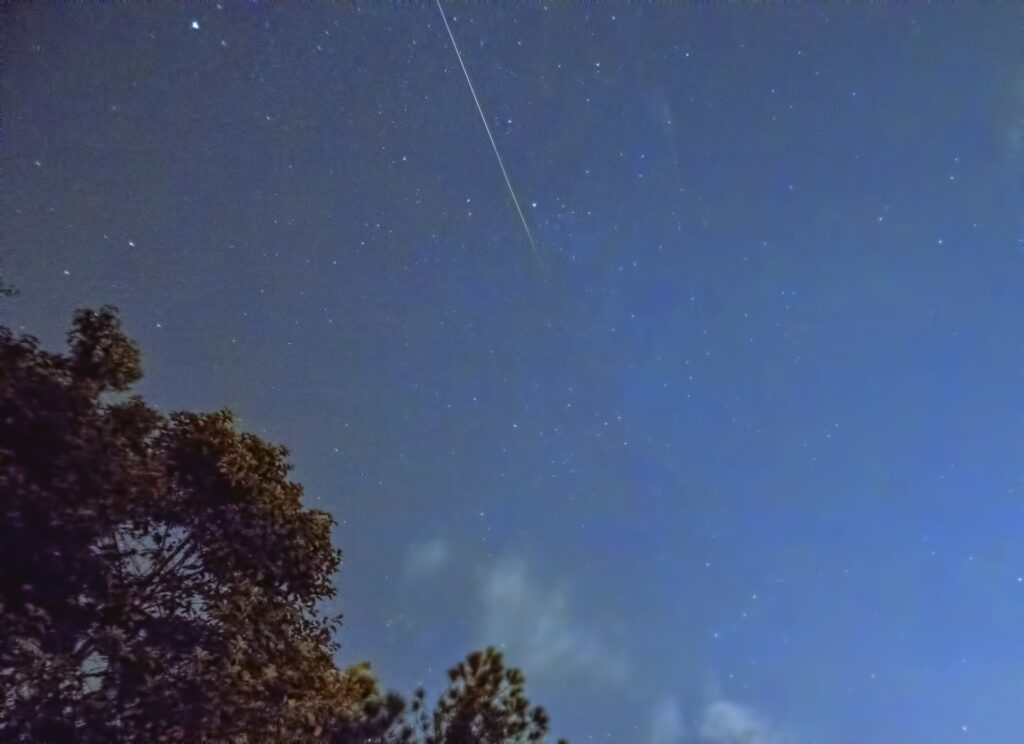How to view the 2022 Perseid meteor shower
August 11, 2022
By Amy Sayle

The peak night of the annual Perseid meteor shower is predicted to be this Friday evening, August 12, 2022, into early Saturday morning, August 13.
Sometimes misleadingly referred to as “shooting stars,” meteors are the streaks of light you see in the sky when cosmic debris slams into Earth’s atmosphere. The Perseids are the result of debris left over by Comet Swift-Tuttle on its periodic trips around the Sun.
What to know about viewing this year’s Perseids:
1. Check your weather. Ideally, you’ll have perfectly clear skies. But even just partly cloudy skies will do. As of this writing, the forecast looks great for Friday, August 12, 2022, for the NC Triangle area.
2. Choose a location. Find a spot away from unshielded outdoor lights, if possible, and with an open view of the sky. If watching from outside your home, turn off your house lights.
If you’d enjoy meteor viewing with a crowd, join Morehead educators, the Raleigh Astronomy Club, and the Chapel Hill Astronomical and Observational Society at Dorothea Dix Park in Raleigh, on Friday, August 12, 2022, between 9 and 11 p.m. There will be telescopes and tours of the night sky, as well as music by the Triangle Sax Ensemble. This event is free. Please register online in advance.
3. Choose a date and time. If you’re determined to try to see the most meteors, plan to go out sometime in the last dark hours before dawn on Saturday morning, August 13, 2022. During the pre-dawn hours, your side of Earth is leading in space and sweeping up the most meteors.
But you can still expect to see some Perseids if you go out during the more reasonable evening hours on Friday, August 12, 2022. You might even see a dramatic “earthgrazer”—a long, slow meteor.
If you miss the peak night of the Perseids, you might try another night. This meteor shower started in the second half of July and will be active through August. Just don’t expect to see as many meteors if you look later in August.
4. Get comfortable. Use a blanket, sleeping bag, or reclining chair so you don’t have to crane your neck and so you can get the widest possible view of the sky.
5. Look up! This may seem like an over-the-top obvious tip, but it’s surprisingly easy to miss meteors by looking at your friends or your phone. (Your phone’s light will also hurt your night vision.)
You don’t need fancy equipment to see meteors—just your eyes. A telescope’s restricted field of view is actually counterproductive for meteor viewing. But at the Dix Park event, we’ll have telescopes for observing other delights in the night sky, such as Saturn (yes, you will see its rings!).
6. Don’t worry about knowing how to identify Perseus. The Perseids get their name from the constellation they appear to fly away from, Perseus the Hero, which lies in the northeastern sky in August evenings. But the meteors can appear anywhere in the sky.
7. Adjust your expectations. On the peak night of the Perseids, from a dark and moonless location, you might see more than one Perseid meteor per minute on average. But this year the peak night coincides with a just-past-full Moon. That waning gibbous Moon will rise soon after sunset and will be up the rest of the night, with its light washing the dimmer meteors from view.
But don’t let this year’s Moon situation or an inability to get to a dark viewing site discourage you. The Perseid meteor shower is famous for producing fireballs—very bright meteors.
8. Be patient. Plan on being outdoors for more than just a few minutes. Your eyes need time to adjust to the dark, and the meteors can come in clumps.
To learn more about Morehead skywatching programs and to download our current star map, see Morehead’s skywatching page. We hope to see you at Dix Park this Friday, August 12, or at another skywatching event this fall!
